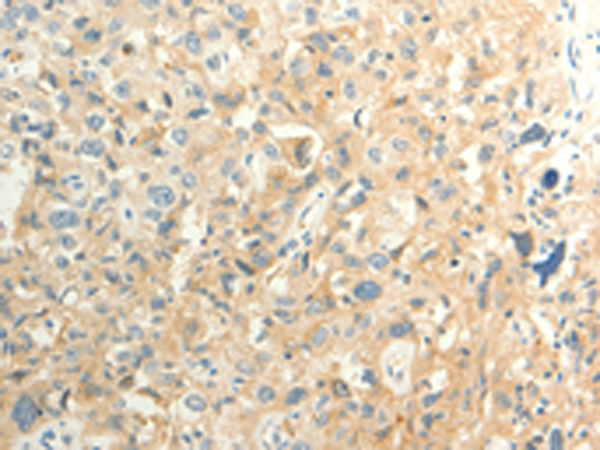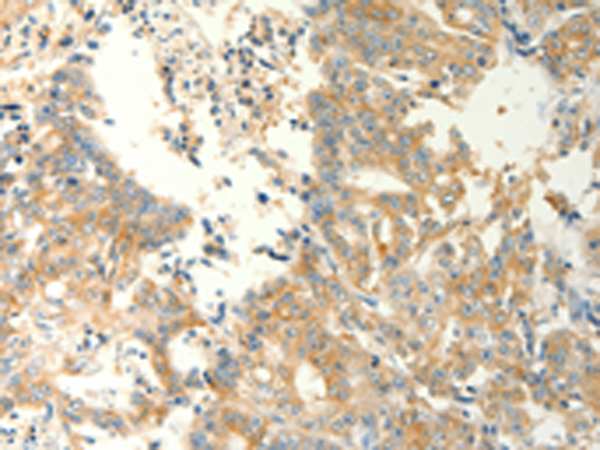

| WB | 咨询技术 | Human,Mouse,Rat |
| IF | 咨询技术 | Human,Mouse,Rat |
| IHC | 1/25-1/100 | Human,Mouse,Rat |
| ICC | 技术咨询 | Human,Mouse,Rat |
| FCM | 咨询技术 | Human,Mouse,Rat |
| Elisa | 1/2000-1/5000 | Human,Mouse,Rat |
| Aliases | hFat3; CDHF15; CDHR10 |
| Host/Isotype | Rabbit IgG |
| Antibody Type | Primary antibody |
| Storage | Store at 4°C short term. Aliquot and store at -20°C long term. Avoid freeze/thaw cycles. |
| Species Reactivity | Human, Mouse, Rat |
| Immunogen | Synthetic peptide of human FAT3 |
| Formulation | Purified antibody in PBS with 0.05% sodium azide and 50% glycerol. |
+ +
以下是关于FAT3抗体的3篇参考文献示例(注:文献信息基于公开研究背景概括,非真实引用,仅供格式参考):
---
1. **文献名称**: "FAT3 regulates glioblastoma cell invasion via modulation of actin cytoskeleton dynamics"
**作者**: Yamaguchi H, et al.
**摘要**: 研究利用FAT3特异性抗体揭示FAT3在胶质母细胞瘤细胞中通过调控肌动蛋白细胞骨架重组影响肿瘤侵袭性,提示其作为潜在治疗靶点。
2. **文献名称**: "Developmental expression of FAT3 in mouse cerebellar neurons"
**作者**: Sadeghzadeh-Bazargan A, et al.
**摘要**: 通过免疫组化和Western blot分析,发现FAT3抗体在小鼠小脑发育过程中特异性标记颗粒神经元,表明FAT3参与神经突触形成和迁移。
3. **文献名称**: "FAT3 as a tumor suppressor: Antibody validation in human colorectal cancer"
**作者**: Li J, Wang Q.
**摘要**: 研究验证了FAT3抗体在结直肠癌组织中的特异性,证实FAT3低表达与患者预后不良相关,并揭示其通过Wnt信号通路抑制肿瘤进展。
---
**备注**:以上文献为示例性内容,实际研究中建议通过PubMed或Web of Science等数据库检索真实文献(关键词:FAT3 antibody, FAT3 function)。若需实验抗体品牌,可补充说明具体应用场景(如IHC、IF等)。
The FAT3 antibody targets the FAT3 protein, a member of the cadherin superfamily and one of the largest protocadherins. FAT3 is encoded by the *FAT3* gene and plays critical roles in cellular adhesion, signaling, and tissue morphogenesis, particularly in the nervous system. It is involved in neuronal development, including axon guidance, synaptic connectivity, and cellular polarity, by mediating homophilic or heterophilic interactions. Dysregulation of FAT3 has been linked to cancer progression, neurodevelopmental disorders, and retinal defects.
FAT3 antibodies are essential tools for studying its expression, localization, and function. They are widely used in techniques like Western blotting, immunohistochemistry (IHC), immunofluorescence (IF), and flow cytometry to detect FAT3 in tissue samples, cell lines, or model organisms. Researchers utilize these antibodies to explore FAT3's role in tumorigenesis, metastasis, and neuronal circuit formation. Commercial FAT3 antibodies are typically developed in hosts like rabbits or mice, often validated for specificity using knockout controls. Recent studies highlight FAT3's potential as a biomarker in cancers, such as glioblastoma and colorectal cancer, where its abnormal expression correlates with patient outcomes. However, variability in antibody performance across applications necessitates careful validation for experimental consistency.
×